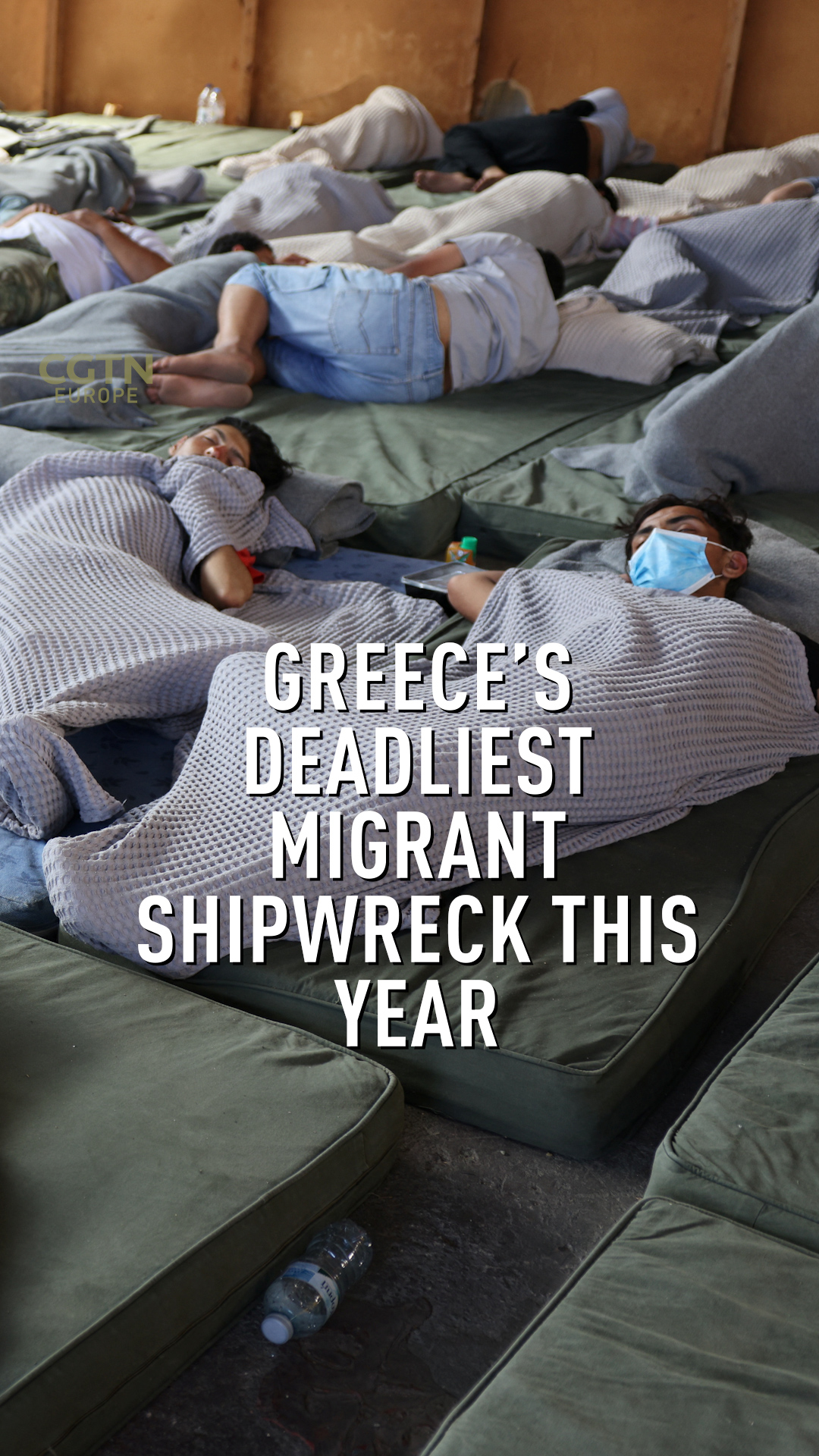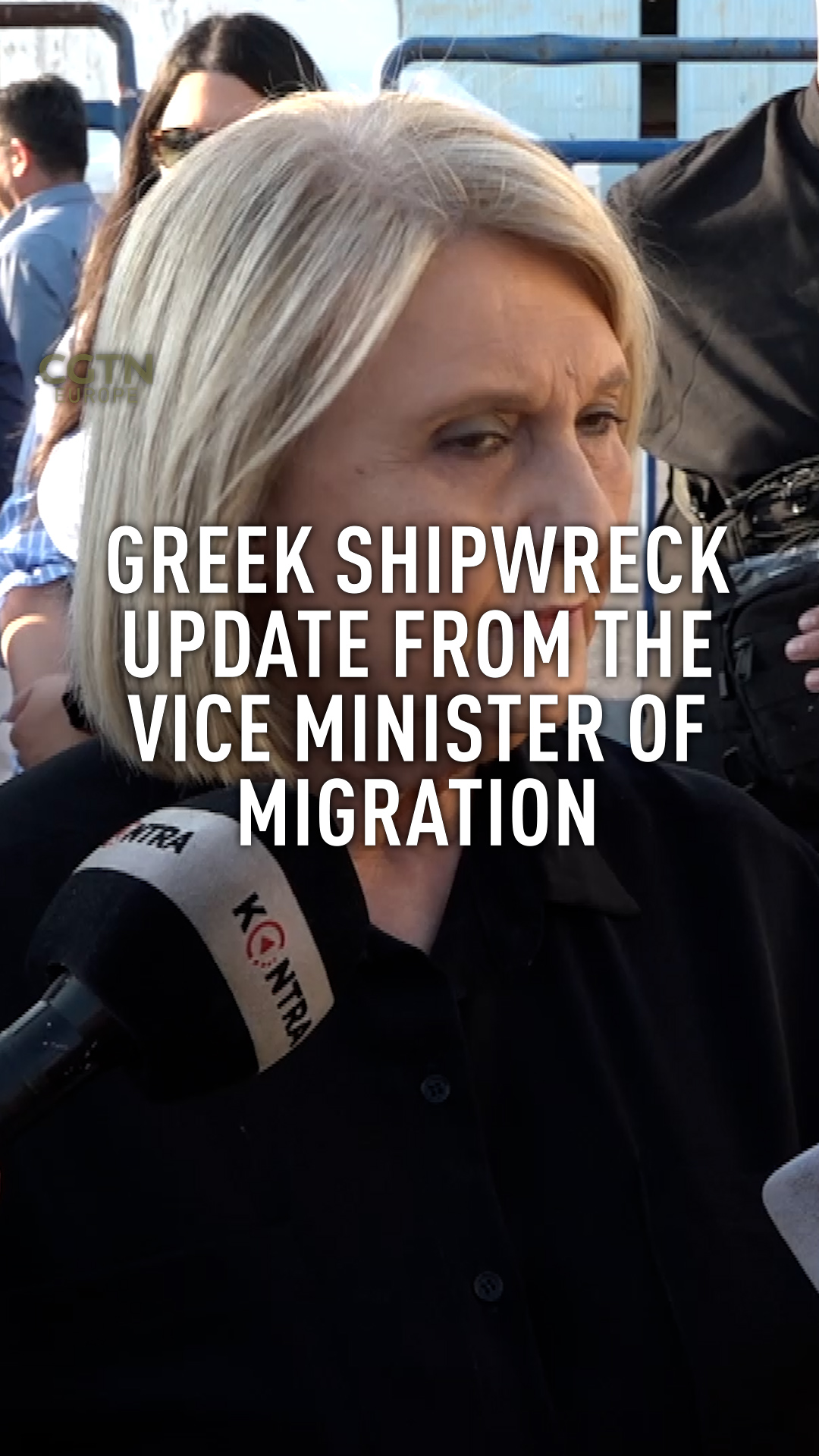01:52

As hopes fade for hundreds of missing people from the shipwreck that sank off Greece on its way from Libya to Italy, Europe is facing more calls to solve the complex issue of migration.
Speaking in Kalamata, where survivors have been sent, Greece's Vice Minister of Migration, Sofia Voultepsi, called on the EU to do more to prevent further deaths.
"The European Union must work harder in this field - we cannot afford any more losing lives in the sea," she told CGTN.
00:59

Erasmia-Erica Roumana, senior protection associate with UNHCR, echoed Voultepsi's comments. "People will keep on moving to flee situations of war, situation of persecution, difficult situations in their country of origin," she said.
Speaking in Kalamata, she told CGTN: "They will find ways to make perilous journeys with overcrowded, unseaworthy vessels. It's very important for states to find ways and safe legal pathways."
As Greece declared three days of mourning, authorities said it was unclear how many had been aboard the fishing vessel. They were investigating an account from a European rescue-support charity that there could have been 750 people on the 20 to 30 meter-long boat.
The U.N.'s International Organization for Migration said initial reports suggested up to 400 were aboard.
Ioannis Vafiropolous, Vice Mayor of Kalamata, told CGTN: "I heard that the number of people on the boat was high, but hopefully it's only rumors. Either way, we are prepared for the worst."
00:23

Trapped in the hold
Charity Alarm Phone, which operates a trans-European network supporting rescue operations, said it received alerts from people on board a ship in distress off Greece late on Tuesday, saying 750 people were on board.
Georgios Vassilakos, a Hellenic Red Cross volunteer doctor, told CGTN: "As time passes, things are becoming more difficult and the hope of finding people slimmer, but the rescue and search mission continues."
Government sources said chances of retrieving the sunken vessel, which had set off from the Libyan port of Tobruk, were remote, because the area of international waters where the incident occurred is one of the Mediterranean's deepest.
News portal Proto Thema and Skai TV reported that, according to witnesses, mainly women and children were in the vessel's hold at the time of the capsizing. Greek sources told CGTN they believed a number of women were on board and there are fears that hundreds of people might have drowned trapped inside.
Was a rescue attempt turned away?
Of the 104 survivors so far transferred by the coastguard to the Greek port city, most were men, authorities said.
CGTN spoke to two British men searching for male cousins. "There's three relatives missing, we found one relative and he's alive," said one.
As it began to flounder late on Tuesday night, people on the vessel's crowded outer deck repeatedly turned down attempted assistance from a Greek coast guard boat that was shadowing it, saying they wanted to reach Italy, according to Greek authorities.
"The event occurred, and was confined within, the Greek search and rescue area, under the specific responsibility of that country," Italy's interior minister Matteo Piantedosi told Italy's SkyTG24 TV channel. "That does not mean that Greece is to blame, it is just circumscribing specific areas of responsibility," he added.
The UNHCR's Roumana told CGTN that identifying victims will be a lengthy process and said survivors were traumatized. She said: "People are in shock and in a very bad psychological situation. Many had also friends or relatives on the same boat and don't know what happened to them. They're asking about their friends, their relatives, and asking to inform their families abroad that they're fine."
Roumana said she had spoken to survivors from Syria and the Occupied Palestinian Territories who reported that fellow passengers were from Egypt, Afghanistan, Pakistan, and Libya.
Another Hellenic Rescue Team volunteer, Triantou Mara, told CGTN: "They spent around six days at sea. Most of them suffered dehydration and low blood pressure as they were underfed. Many suffered severe burns from the sun all over their body."

Syrian Kassam Abozeed, shows a photo of him and his wife, believed to have been onboard the vessel. /Stelios Misinas /Reuters
Syrian Kassam Abozeed, shows a photo of him and his wife, believed to have been onboard the vessel. /Stelios Misinas /Reuters
Tough stance
Greece is one of the main routes into the EU for refugees and migrants from the Middle East, Asia and Africa.
Under a conservative government in power until last month, Greece has taken a harder stance on migration, building walled camps and boosting border controls.
Libya, which has had little stability or security since a NATO-backed uprising in 2011, is a major launching point for those seeking to reach Europe by sea, its people-smuggling networks mainly run by military factions that control coastal areas.
The U.N. has registered more than 20,000 deaths and disappearances in the central Mediterranean since 2014, making it the most dangerous migrant crossing in the world.
On Thursday Spain, soon to take over the EU's rotating presidency, said it expects to conclude the bloc's migration deal under its presidency and seek closer cooperation with migrant origin countries.
Interviews conducted by CGTN's Evangelo Sipsas
Subscribe to Storyboard: A weekly newsletter bringing you the best of CGTN every Friday
Source(s): Reuters